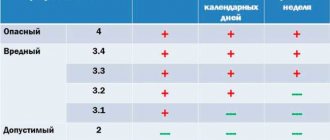Why did the list need to be updated?
Today, the List approved by Decree of the Government of the Russian Federation dated February 25, 2000 No. 162 is used. Its redundancy has long led to disputes in the courts and caused criticism from experts.
For example, back in 2021, the UN Committee on the Elimination of Discrimination against Women recognized the list as discriminatory and recommended that adjustments be made to it. Indeed, over 19 years, working conditions, thanks to technological progress and automation, have improved significantly and many professions harmful to women’s health have ceased to be so harmful.
Why then did they decide to revise the ban?
The list of 456 professions prohibited for women was approved in 2000, but, as Ksenia Mikhailichenko, lawyer and head of the labor law practice of the Moscow bar association Soldatkin, Green and Partners, says, it repeats a similar list from 1974 almost without changes: “Still the leadership of the USSR decided that fertility and demography in general are a very important agenda. Therefore, a woman is first and foremost a mother, and factors that can negatively affect her reproductive health must be excluded.”
The list, compiled more than 40 years ago, has not been revised for many years. During this time, most of the 456 professions have become much safer and more technologically advanced, and some have become a thing of the past. For example, number 370 on the list is “steam locomotive driver” - the mass operation of this type of transport on the territory of the USSR ended in the late 1970s.
It turns out that it is not the state that has become more favorable to the ideals of equality, but work that has moved from one class of “harmfulness” to another. How dangerous work is in a particular place is determined by specially accredited organizations, which, based on regulatory documents (for example, SanPiNs), decide which category the working conditions fall into - optimal, acceptable, harmful or dangerous, says Saurin.
In what areas of activity is women's work limited?
The professions in the list are broken down by type of production: chemical, underground, mining, metalworking, well drilling, oil and gas production, ferrous metallurgy, non-ferrous metallurgy, radio engineering and electronic production, production, repair and maintenance of aircraft, shipbuilding and ship repair, pulp production, paper, cardboard and products made from them, cement production, stone processing and production of stone foundry products, production of reinforced concrete products and structures, production of thermal insulation materials, printing production, textile and light industry, food industry, railway transport, production and work of other types of economic activities.
Now every woman can become a typist?
As follows from paragraph 1 of the notes to the notorious list, employers are already
may use women’s labor in prohibited work “subject to the creation of safe working conditions, confirmed by the results of certification of workplaces.”
On the one hand, this means that even within the framework of the paternalistic logic of the state, with the further development of technology, the list of professions prohibited for women can be reduced or completely abolished: if all professions become safe (or dangerous ones simply become a thing of the past), the need to “protect” them from women will disappear.
On the other hand, the inability to provide safe working conditions may become grounds for denying women employment. Thus, Svetlana Medvedeva, having gone to court, demanded that the company, which refused to hire her due to dangerous working conditions, make these conditions safe. However, the court considered that the company, which decided simply not to hire the woman, acted correctly - and in the interests of Medvedeva herself.
This is not a very good position, Mikhailichenko believes: it turns out that work is unsafe for both women and men, but only the latter can independently choose whether to put themselves at risk or not. Probably, such a half-measure is due to the fact that the state and society are not yet ready to recognize a woman’s right to independently dispose of her body.
When should I check the new list?
The new list will not always need to be used.
The introductory part of the list specifies to which categories of female personnel the standards should apply. The list applies to women whose working conditions are classified as a harmful and (or) dangerous class of working conditions according to the results of the special labor conditions assessment, as well as to women if safe working conditions in their workplaces are not confirmed by the results of the special labor conditions and a positive conclusion of the state examination of working conditions (beyond the row exceptions). The work mentioned in paragraphs 89 - 98 of the list of the Ministry of Labor (among them firefighting, transportation, loading, manual unloading of pesticides, diving work) is prohibited for women, regardless of the conditions at the workplace.
What jobs should women not be used for?
According to the list approved by government decree No. 162, which is valid for another year, prohibited professions for women in Russia in 2021 are associated, for example, with the following jobs:
- underground in the mining industry;
- forging and pressing and thermal;
- some construction and repair and construction;
- in the field of ferrous and non-ferrous metallurgy;
- in civil aviation;
- in various manufacturing sectors.
The resolution also lists specific professions that are not available to women. This is a metal pourer, a miner who works with hand-held pneumatic tools, an asphalt concrete worker, a carpenter, a blacksmith-driller, an aircraft mechanic (technician) for instruments, electrical equipment, engines, a sailor, a car repairman who manually washes engine parts, a train builder, etc. A total of 456 prohibited professions have been approved.
At the same time, it is clarified that the employer has the right to employ women in the jobs (professions, positions) included in the list if safe working conditions have been created, and this is confirmed by the results of a special assessment of working conditions and the positive conclusion of the regional Sanitary and Epidemiological Surveillance Service.
Adopting the experience of the modern EU
These restrictions in modern society seem absurd and outdated. Indeed, in most more developed countries, girls occupy similar and even more difficult and dangerous professions. The most popular ones that EU citizens can occupy, unlike Russia:
- A carpenter. If in our country a woman cannot be a carpenter, then in the European Union countries they no longer even track gender statistics in the industry. This means that the profession is no longer considered purely male.
- Cattle slaughterer, familiar to many Russian girls living in villages and villages. Work is still prohibited in Russia.
- Bus driver, truck driver, construction equipment driver. If we have restrictions on carrying capacity, number of seats, etc., then European women independently decide whether to choose such a profession.
- Military specialties. In Europe, a woman can, at her discretion, do military service in the army, get a job as a sniper, sapper or tank driver.
- Captains of sea vessels and train drivers are also a normal European practice.
Thus, looking at its neighbors, the Ministry of Labor of the Russian Federation admits that over the past 30 years, working conditions have changed significantly. Many of the professions on the list are no longer as difficult or dangerous for reproductive health.
In April 2021, the authorities compiled an updated list, slightly loosening their grip on this matter. They are not ready in principle to give up restrictions.
The new list has been significantly shortened and will now include:
- ban on working with chemicals, vibration, infrasound and radiation,
- ban on work in the mining industry,
- women still cannot be firefighters and divers,
- You will not be able to perform other heavy physical work.
The list is expected to be published in mid-autumn, after its official adoption.
Related materials
00:01 — March 7, 2019
“Feminists are not born”
A short guide to modern feminism in Russia
But let’s look at the current state of women’s rights in the labor sphere: modern Russian legislation at the country level still affects women’s right to freely choose a job in the form of an annex to the Labor Code - government decree No. 162 of February 25, 2000 “ On approval of the list of heavy work and work with harmful or dangerous working conditions, during which the use of women’s labor is prohibited,” which until recently listed 456 types of work prohibited for women.
Some of these jobs are outdated due to changes in technology, many are automated, some involve tasks performed by a very small number of narrow specialists, but for the most part the list consisted of quite mass specialties, many of which involve receiving a salary above the Russian average and do not require separate preliminary specialized education .
For example, a metro train driver: the Moscow metro invites men to work, requiring only a general secondary education, a stipend of 30 thousand rubles is paid for the duration of the training (about seven months), the employee’s salary after training is from 65 to 100 thousand rubles. In addition to salaries, the employer provides employees with uniforms and workwear, compensates for transportation costs during work and on vacation, provides the opportunity to relax in their own health center, provides financial assistance for marriage, the birth of a child, expensive operations and funerals of relatives, and organizes vacations. for children.
Moscow metro train drivers
Photo: Evgeny Odinokov / RIA Novosti
But until recently, it was believed that women did not need such offers: driving a variety of special equipment, freight transport, and passenger transport, including well-paid intercity bus transportation, road construction, and construction of buildings and structures - in all these areas a woman could find a job only for low-paid service or administrative positions.
According to Rosstat data for 2021, of the working specialties in Russia, two groups are most in demand: drivers (cargo and special transport, regular passenger routes) and road and real estate builders. The total number of jobs in these specialties is in the millions.
In addition, there are specialties that are not directly prohibited, but the already imposed ban makes hiring women completely unprofitable and inconvenient, limiting them in the tasks they perform. Why would an employer need an inferior specialist who, according to labor laws, will have to pay full salary? Such a specialty is, for example, a plumber. The restrictions placed on women prevent them from being sent, for example, to repair a broken sewer pipe in a flooded basement. This is a fairly common problem that requires immediate response from utility services.
Is it possible to call a female plumber? From the official municipal service - no, it simply won’t be found there. But from a small private company you can: you cannot hire a woman, but you can enter into an agreement with her as an individual entrepreneur and actually use her labor. At the same time, risks remain for her: she is not protected by the Labor Code as an employee, because she is not one, but is essentially a company that has entered into a contract agreement with another company that collects and distributes orders for plumbing work. And as an individual entrepreneur, she will have a lot of specific difficulties in accounting and tax accounting, opening a special bank account, pension contributions and a bunch of other boring and not always simple tasks that the employee does not know about.











